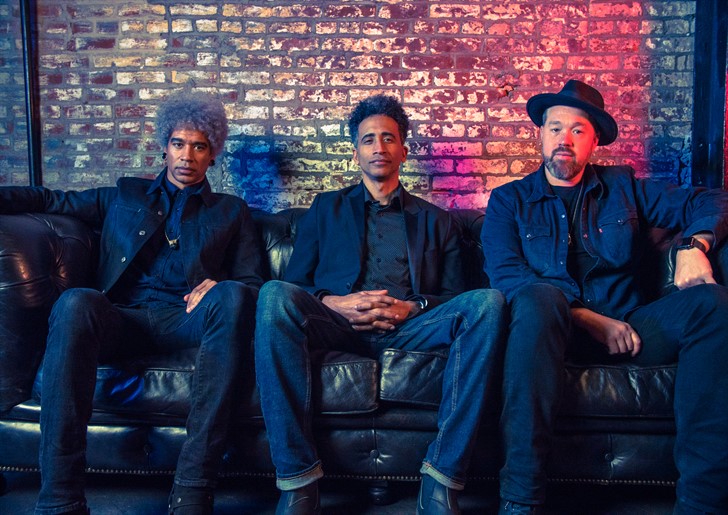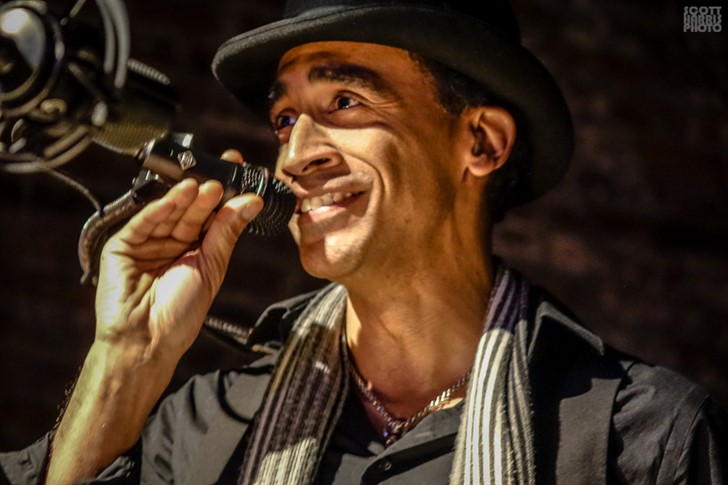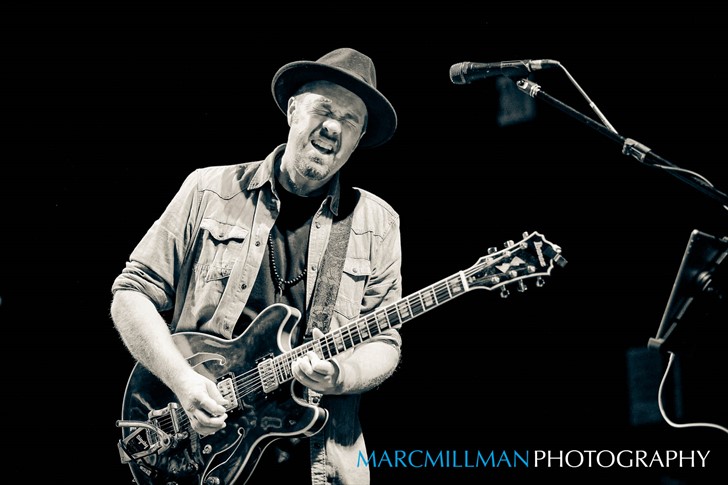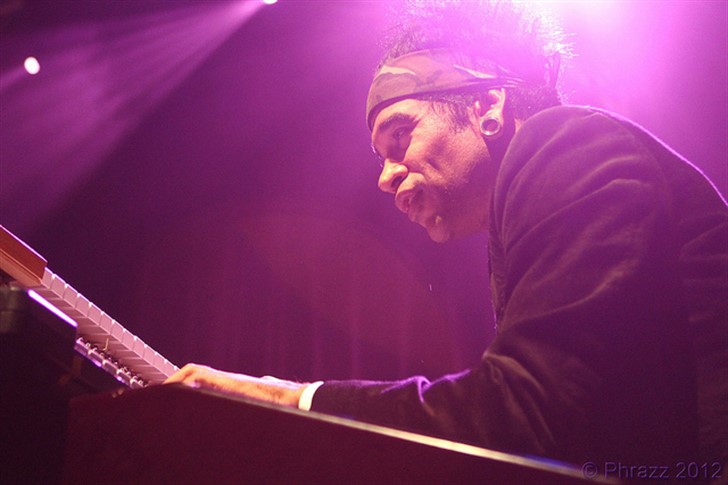Soulive: Cinematic Visions

In October 2017, Soulive returned to Japan for a run of shows. Given their robust following in the country, the gigs were, as expected, an unequivocal success, and the trip gave the trio’s members a chance to catch up away from their responsibilities and range of projects back home.
They even started discussing the prospect of getting back into the studio and, much to everyone’s surprise and despite their hectic individual schedules, less than two months later drummer Alan Evans, keyboardist Neal Evans and guitarist Eric Krasno were recording what would become their first new music in six years. And, two months after that, they unveiled the Cinematics Vol. 1 EP. This was hardly an established group’s typical, drawn-out album cycle, but the expedited idea-to-release approach that has become increasingly attractive—and attainable—in the current musical landscape.
“Pretty much from the beginning of Soulive, I’ve wanted to do exactly what is happening right now,” Alan says, calling from Iron Wax, the Western Massachusetts recording studio that he owns and operates. “I was struggling with the idea of going into a studio and then having the record company or whoever tell you, ‘Oh, we’re gonna need six to eight months to set this up.’ Like, ‘Are you kidding me?’ All that time would pass, and you’ve moved on.”
“I’ve felt like that for many, many years,” Alan’s brother, Neal, agrees, while hunkered down at a studio session of his own in Brooklyn. “But then you say that and you fall into this trap of doing things a certain way, just because they’ve been done that way.”
Soulive aimed for a quicker album release with Spark!, their 2012 Melvin Sparks-inspired collaboration with Karl Denson, but got bogged down in the usual machinations of traditional music distributors. This time around, the band signed up for Brooklyn-based independent digital music distribution service TuneCore just one day after they finished recording Cinematics.
“We’re at a place right now where we just want to make great music and put it out when and how we want to,” Krasno says during a rare break at his Brooklyn home while preparing to fly out West for a run of shows with Phil Lesh. “We’re not trying to get on the pop charts or anything so, for us, it’s a freeing feeling to just be creative and put it out, and not put too much expectation on it—just try to make it something that we would really enjoy listening to ourselves.”
 Alan Evans (Scott Harris)
Alan Evans (Scott Harris)
“Music used to be singles, and it’s come back to that,” Neal says. “The platforms now are basically made for that—people picking and choosing what they want to download from an album. It’s more about just getting the material out there.”
“I don’t really like sitting on stuff too much,” Alan adds. “I would rather just get it out there and then move on—I don’t like going backward in time. Not to say that I’m not psyched about everything that we’ve done in the past—of course I am. But when it’s fresh, man, you just want people to hear it. Personally, I need to move on and create something new.”
Alan has been creating a lot of new things recently, teaming up with a number of established musician friends and younger artists to help bring their visions to fruition at Iron Wax. And, these days, the drummer relishes his position behind the boards.
“I’ve been an engineer for almost as long as I’ve been playing music,” he says. “I love being in the studio, on the other side, just as much as I love playing music.”
The drummer has had a zest for producing from an early age. When most kids were dreaming of being rock stars onstage, he was just as excited to strive for greatness further down on the list of credits. “I remember looking at all the photos on the albums—like Rudy Van Gelder recording John Coltrane, Eddie Kramer recording Hendrix, all these cats. That got me just as pumped up as wanting to go out and gig.” And now that he’s settled in at Iron Wax, Alan is creating the sorts of sounds he’s always dreamt about.
“At this point in my life, things are just really clicking,” he says. “All the sounds I’ve wanted to get out of the studio—everything is becoming easier, and I can relax more and enjoy the experience, rather than trying to troubleshoot and learn on the gig. Although, I’m always constantly learning in the studio.”
 Eric Krasno (Marc Millman)
Eric Krasno (Marc Millman)
Alan’s bandmates are reaping the rewards of his comfort level at Iron Wax. Although, as Krasno notes, all three Soulive members are capable producers in their own right, Alan’s home-field advantage put him at the helm for the Cinematics EP.
“He’s such a great engineer,” Krasno says of the drummer. “It wasn’t like one person was necessarily doing everything, but Alan was definitely at the board. He just had it so down that there wasn’t really much to say. He knew what to do.”
“We were only here for two days, so I had a good idea of what I wanted to hear,” Alan says. “I had the sounds pretty dialed in by the time they got here, so it was ‘plug and play.’ We started recording a little bit of something, I hit playback, and no one complained about anything, so we just went
with it.”
It’s a testament to the trio’s chemistry and experience playing together over nearly two decades that they could enter the studio after a long break—Soulive last recorded together in 2015 for an as-yet-unreleased project with Pretty Lights—and lay down five full tracks in just two days, barely discussing the direction the music was taking.
“With us, it’s like no time’s passed,” Alan says. “We just get together and start playing, and usually something pretty good comes out of it. It’s pretty much effortless when we get together.”
“There’s never any rust to shake off,” Neal agrees, saying that it was his brother’s in-studio verve that helped jumpstart the fruitful two-day session. “Al’s engines were turning, so he was just shooting us ideas, like, ‘I was just in the studio…’ He’ll get psyched, working on drum sounds and those kinds of things.”
Alan’s work in the studio before his bandmates arrived, tweaking levels and finding sounds, allowed them to come in with their pedal boards and immediately start the creative process. But the real impetus behind the musical feel of Cinematics Vol. 1—which many Soulive fans might find a bit surprising—started to take shape during the aforementioned studio session with Pretty Lights, when the band began to experiment with songs molded around soundscapes rather than their usual riff-and-solo-based compositions.
The trio’s return to a groove-oriented sound that winks at their earliest days solidified during their fall 2017 run in Japan. It will also likely continue its prevalence in the Cinematics series’ ensuing installments. From the pulsing opening track “Kings March” to the spaghetti western feel of “Millers Last Stand” to the surfer-chill closer “Waves,” Cinematics Vol. 1 never hits the listener over the head with the jazz-funk explosions for which Soulive are known. Instead, Soulive opt for more tightly knit pockets of sound that are as pleasing as anything the group has come up with thus far.
“It’s definitely different than what people would think of as Soulive,” Alan says, mentioning that “Waves” is the only track that contains what he would call a solo. “Everything else is just painting on a canvas, man. At this point, that’s where the three of us are, in terms of recorded music. I could really care less about hearing a solo on a record.”
“I always like when we improvise as a band,” Krasno adds. “In the recent years, a lot of that has been happening, where we come up with ideas and grooves on the spot, but it’s not necessarily about a solo. It’s like, ‘OK, let’s just vibe out on this bass line and play these chord progressions.’ We were getting into those vibes in Japan—these psychedelic breakbeat grooves—and we’d just ride on them for a while.”
“The music that we’re trying to create here is not about us,” Alan says. “It’s not about our ego, or all these techniques we practice to get perfect when we get in the studio—stuff you think about, especially, when you’re younger. I just want to create something that, when you drop the needle—or hit play—takes you somewhere. It’s like playing the movie soundtrack of your mind.”
Hence the title of the Cinematics EP series, which will be released throughout 2018, though they don’t have a set plan for recording the rest of them yet. (Neal says there might be three more volumes, but not even that has been decided.) However, what is clear is that Soulive have found a sound that suits them for now.
The members of Soulive, especially the Evans brothers, were inspired by film soundtracks from an early age. Alan speaks of growing up with his brother and being fascinated by the genre, and Neal has even composed scores for a number of HBO documentaries and plans to work on a film score this year. While all three band members say that they didn’t discuss any specific inspirations in the studio, Krasno throws a few names out for reference, like Ennio Morricone, composer for director Sergio Leone’s iconic films such as The Good, the Bad and the Ugly, and Jerry Goldsmith, whose work on the original Planet of the Apes he praises for its use of “huge reverb” and “weird harpsichord sounds.”
Neal actually may have been the one who predicted this shift in Soulive’s sound, in a way, when he released his 2012 solo album Bang, a project that he frequently referred to as utilizing “cinematic breakbeats,” but he knows that it’s really all in the presentation—and in the listener’s state of mind. “There’s imagery,” he says. “And there’s this concept of thinking about what this background could be placed against. We could say all this music’s for ballet and people would be [thinking of ] ballet dancers when they heard it but, to think about it more cinematically, that lends itself to this plethora of stories.”
 Neal Evans (Phrazz)
Neal Evans (Phrazz)
Soulive, who first formed in 1999, are coming up on two decades together as a band, and it’s not hard to see why they’re still going strong as a unit. Krasno and the Evans brothers are all fiercely creative individuals, and while that might be an unsustainable situation in a different setting, they’ve made it work by giving into that and by not limiting their outlets to one group.
Krasno found his singing voice on his 2016 solo album Blood From a Stone, the first to feature him prominently on lead vocals (he doesn’t see that transitioning into the Soulive repertoire any time soon, by the way) and has busied himself in the studio by producing albums for Aaron Neville, Nigel Hall, Norah Jones and more; Neal appears on Jack White’s new solo album, has been working with Sonya Kitchell and is part of the another Brooklyn-based trio, &Co; Alan recently completed his first stint in Karl Denson’s Tiny Universe since 1998 and started the new project Matador! Soul Sounds with The New Mastersounds guitarist Eddie Roberts. Soulive may be where the three musicians gained their footing in the music world, but it will hardly be the last word in their legacies.
“I’m so thankful for Soulive and Alan and Neal because of the relationship that we’ve maintained as friends, in which we allow each other to go off and do other things,” Krasno says, explaining how he still works with his Soulive bandmates often on his solo projects. “You can’t make one band your everything. At least, I can’t. And when we’re ready to do Soulive, we do it. I can’t ever see it dying. As long as the three of us are alive, I think Soulive will be alive.”
“It was tougher when we didn’t have that outlet, when we were doing more Soulive,” Neal remembers. “It got to that point where it was in the back of our minds and then, once we all started doing it, it just made everything so much easier. You can’t fight your creativity. There would be no point in me playing music if I stifled myself in any way.”
“That’s how we’ve stayed together this long,” Alan agrees. “You don’t get burned out—you see the signs—and when you get back together, you have some new things to talk about, literally and figuratively.”
“We’ve had a lot of great experiences together,” Krasno says. “We’ve traveled all over the world together, written music together, grown up together. We’ve watched Alan’s kids grow up. It’s a beautiful thing. We’re family at this point. I mean, they are family, but now they’re my family as well.”
This article originally appears in the April/May 2018 issue of Relix. For more features, interviews, album reviews and more, subscribe here.



















